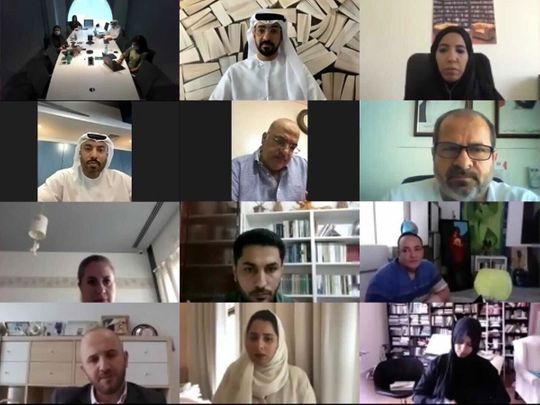
Sharjah: Publishers in the UAE have highlighted the need for industry solidarity and appealed to the Emirates Publishers Association (EPA) to establish a local book distribution company to weather the current crisis stemming from the economic fallout of the COVID-19 pandemic.
Speaking at a virtual meeting held by EPA, participating publishers said the cancellation of local, regional and international book fairs and cultural events has seen the book market plummet, leading to record losses of 50 to 85 per cent in gross sales since March this year. The virtual meeting, attended by senior EPA officials including its president Ali Bin Hatem and executive director Rashid Al Kous, also saw the participation of more than 50 EPA members.
See more
The meeting focused on the impact of economic disruptions on the local publishing industry and outlined strategies and solutions to ensure that all those in the publishing value chain are supported. Other topics addressed at the virtual meeting included the strategic role of EPA in easing economic challenges by facilitating economic and trade licence renewals, lease contracts, publication invoices, and licenses of the National Media Council, among other essential services.
Dh1 million fund
In his opening address, Al Kous said: “It was the stark realities of the publishing market that led the EPA to launch the ‘Emirates Publishers Emergency Fund’ worth Dh1 million in June to empower publishers in the UAE severely impacted by the pandemic and ensure the continuity of their businesses. This virtual meeting is being held against the same backdrop as EPA seeks to listen attentively to ideas and suggestions from its members to boost industry resilience and emerge out of it stronger.” He added: “A survey will be sent to all our members to explore and understand the precise nature of their needs to enable EPA to develop an inclusive strategy that works in the best interest of all stakeholders.”
Speaking at the virtual meeting, Bin Hatem said: “This meeting is aimed at listening to the ideas, needs and suggestions of our publishers as well as analysing and discussing them in depth, because we believe that cooperation and team work is vital to alleviate the hardships prevalent in the publishing sector today. We look forward to visionary, innovative ideas that best serve the sustainability of this sector.”
Rise of eBooks
Discussing a range of challenges, several publishers emphasised that with readers gravitating towards eBooks, the future of print books was at risk. Shifting consumer habits led to a twofold increase in sales for eBooks when compared to print books and this accounted for 75 per cent of gross sales in the book market. EPA officials recommended that publishers need to look at the evolving digital future of the publishing industry as an opportunity reach out to new target audiences and markets. EPA also urged publishers to work on producing audio books to expand their digital footprint while continuing to rebuild the traditional print market and strive for the sustainability of publishing houses.
Fewer releases
Several publishers admitted they had managed to navigate the crisis but were concerned about the marked dip in new book releases. While previously around 60 titles a year were published, this year saw the publication of only around 15 to 20 books. Members also urged the EPA to facilitate participation in school and university activities in coordination with the Ministry of Education (MoE) to issue the needed permits, highlighting their keenness in venturing into educational publishing. Meanwhile, a few publishers spoke of the importance of raising awareness about the protection of intellectual property rights.
Protecting copyrights
During the meeting, EPA showcased a case study about the ‘Copyright Study’ that aims to protect the copyrights of creative authors who cannot protect their rights easily, as well as offer supportive services such as tracking piracy activities and providing permits to students at universities and schools. These permits will enable students and users to access books legally and with limited copyright permission. This will help raise greater awareness on copyright protection, facilitate access to books under copyright, and reduce costs for students.
Concluding the meeting, members lauded the launch of EPA’s Emergency Fund initiative to revitalise businesses. They emphasised that the move was critical in sustaining the sector and empowering publishers to compete under the challenging circumstances. Members also commended EPA for providing 19 publishing houses with Dh356,000 to revive their businesses.








